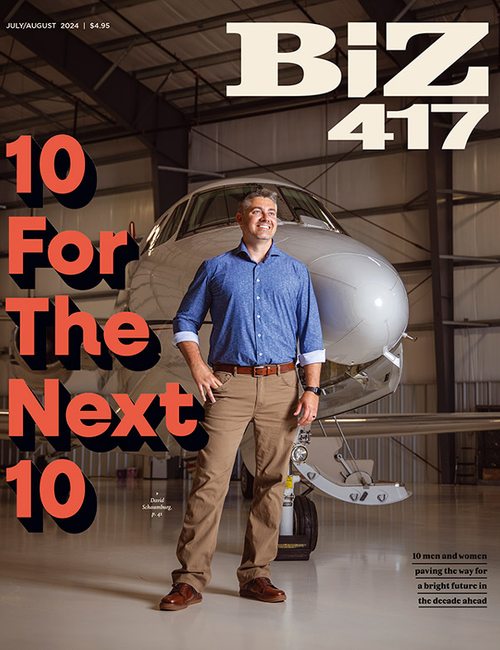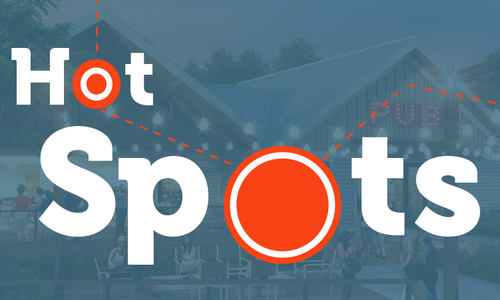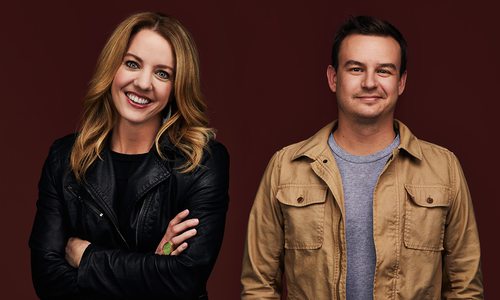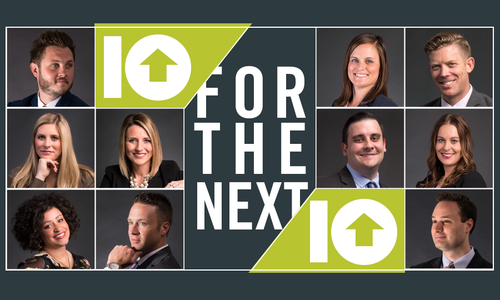Many entrepreneurs believe their business is worthy of franchising, but very few go through the thousands of dollars and piles of paperwork it takes to make such dreams a reality. We asked the pros behind southwest Missouri’s most successful food franchises their processes, plans and secrets to success so we could share their stories and highlight their best advice. Ready to grow up and out on your own? You will be soon.
Strategy
The Local Food Franchise Growth Game
Southwest Missouri's most successful homegrown food franchises are blowing up and out with these winning business strategies.
By Savannah Waszczuk
Sep 2018
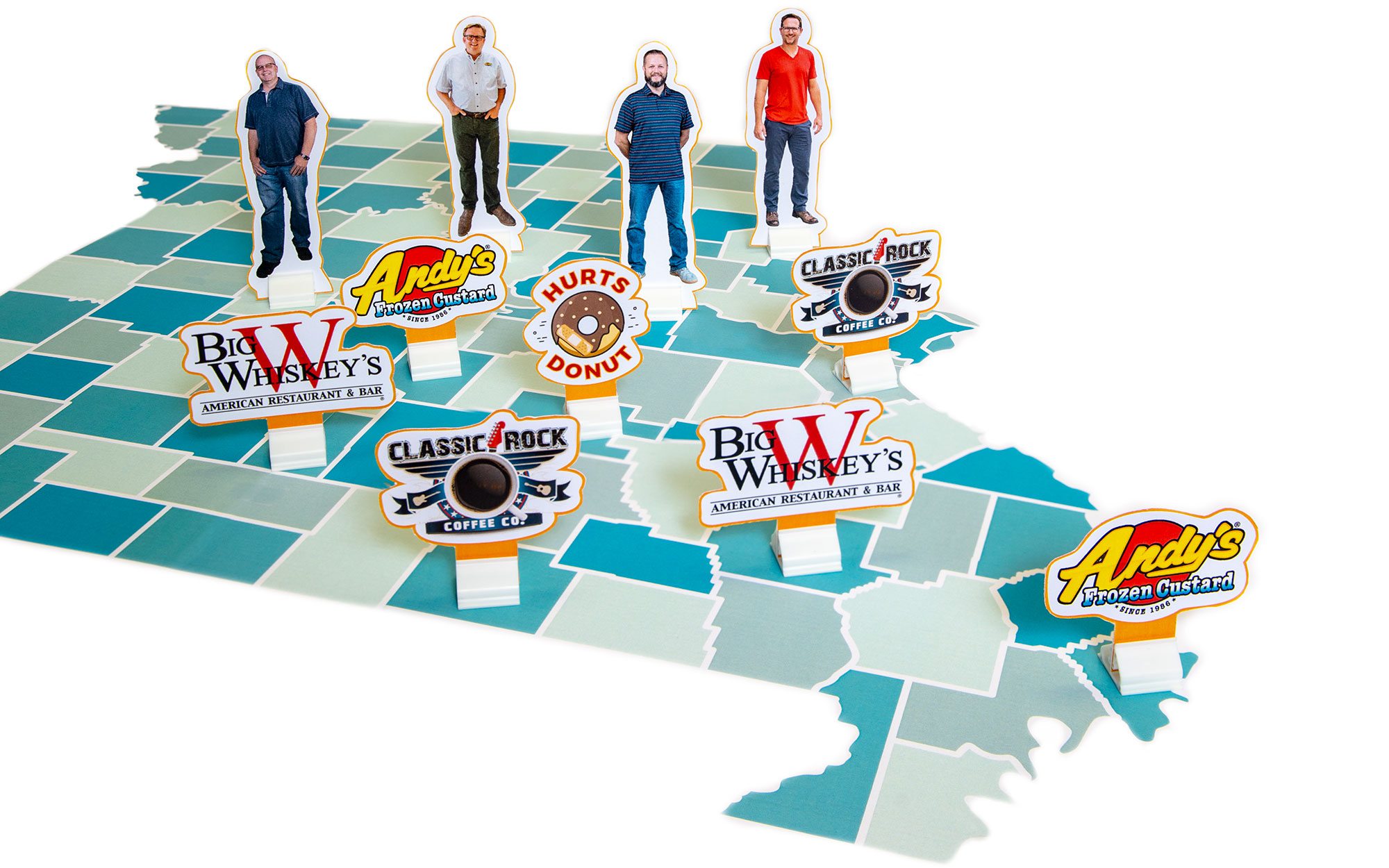
Jump to a Franchise
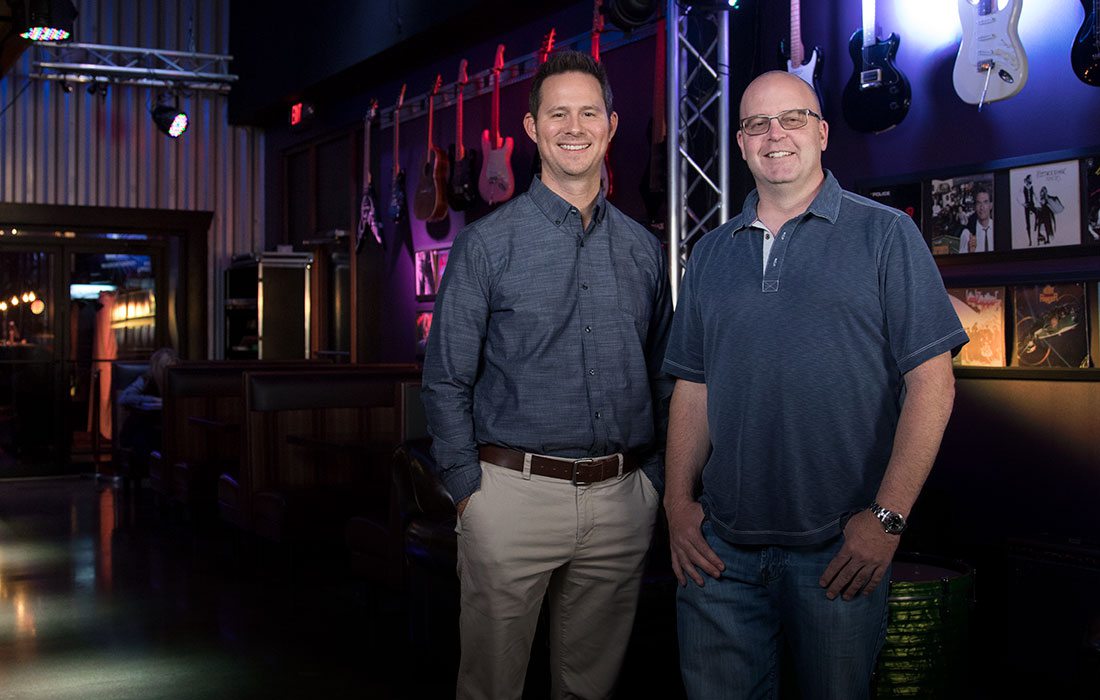
Sweat Your Structure
Classic Rock Coffee Co.
Founding Year: 2011
Began Franchising in: 2013
Number of Locations: 12 (1 corporate store, 11 franchises)
If you want to sell franchises, your concept and your products must be transferable. The pros at Classic Rock Coffee Co. share what they’ve learned as they’ve grown around the globe.
In fall 2011, Kent Morrison opened the doors to the first Classic Rock Coffee Co. in Springfield, Missouri. Little did he know then that the second location of his themed coffee shop was a couple of years—and about 8,000 miles—away. “Location No. 2 was Pakistan,” says Morrison, who first decided to open a coffee shop after he opened smoothie bars in gyms. “We knew that with our theme and uniqueness, Classic Rock should work as a franchise. But I originally thought our first few may be in Kansas City, or St. Louis, or Tulsa, [Oklahoma], or Little Rock, [Arkansas].”
Although it was not planned, the Pakistan sale worked, and Morrison attributes this success to the work the team did in the years prior. “We knew we needed to learn a bit more about running a coffee shop before we started franchising,” Morrison says. In the first year of operation, the team took note and created a business model with proven experience and transferable knowledge—both key components for growth. Then, they hired Brett Payne as Classic Rock’s director of franchise operations in 2013.
Payne helps with the nitty gritty—things like market research and a whole lot of paperwork—and with many big-picture tasks, such as making sure the company is desirable to everyone. “Our concept is unique because it’s generally accepted everywhere in the world,” Payne says. “There’s hardly anywhere in the world where people don’t drink coffee, and everybody in the world likes classic rock music.”
“Everything you do has to be scalable and transferable.”— Brett Payne, Director of Franchise Operations at Classic Rock Coffee Co.
Once you find a concept that is both desirable and adaptable, it’s time to truly analyze your products. “Everything you do has to be scalable and transferable,” Payne says. “You have to make sure whatever you’re doing can be duplicated. You also have to consider if it can be duplicated in your other locations.” While the coffee drinks are similar at all of Classic Rock’s dozen locations—six located in the United States and six internationally—each store is responsible for its own food. “We have a sandwich called the War Pig,” Payne says. “That’s a song by Black Sabbath. It’s made with bacon. Well, in Pakistan, they don’t eat pork, so they made a sandwich called the War Chicken. We had to tell them that wouldn’t work.”
Classic Rock is also careful to consider where to build in a proposed city. The company uses a proprietary algorithm that analyzes factors including traffic, population density and even residential buying patterns to determine where stores have the highest chance of being successful. The team then sends location options to the franchisee to make the final decision.
Although the overseas locations might take a bit more paperwork on the front end, Morrison says it’s most definitely a rewarding process. “There are people out there right now in cities all over the world with a Classic Rock coffee cup in their hand,” Morrison says. “It’s very gratifying, and it’s very humbling. There are people who put a lot of faith in us, so we want to do good for them.”
KEY: Red Coffee Cup, Open Store
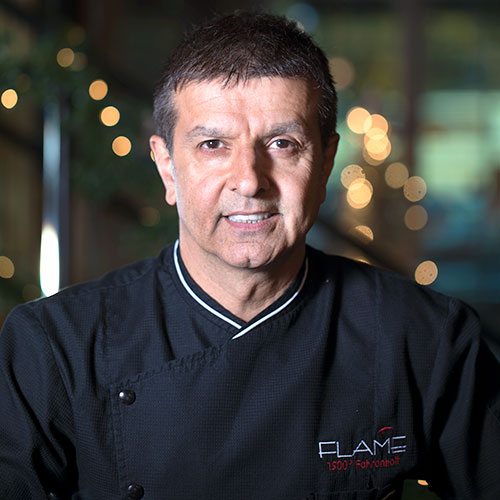
Next in Line: Mike Jalili
People familiar with the history of 417-land’s fine dining scene are quick to recognize the name Mike Jalili. Years ago, Jalili and his family introduced southwest Missouri to Bijan’s Sea & Grill, a downtown Springfield restaurant that arguably pioneered Springfield’s exposure to first-class fare paired with top-notch service.
Bijan’s closed in the mid-2000s, but Jalili continues to wow diners with creations at Flame Steakhouse, Touch Restaurant and Black Sheep Burgers and Shakes, a slightly more casual eatery that offers a fancied-up version of a burger paired with its best buddies. “We’ve had so many phone calls, emails and conversations,” Jalili says. “So many people are seeing if we’re ready to franchise Black Sheep.”
While Jalili hopes to franchise the eatery one day in the future, it’s not his focus quite yet. Instead, he’s busy making sure all else is running smoothly at all of his other eateries—something he’d advise any business owner to do before they attempt to expand. “When you open more than one restaurant, it becomes a different animal,” Jalili says. “Your job description changes. You have to learn how to delegate. You have to learn to deal with managers, and you must be willing to give up certain things. You have to learn you are not in control—your managers are—and your job is now to make sure these managers are doing their job.”
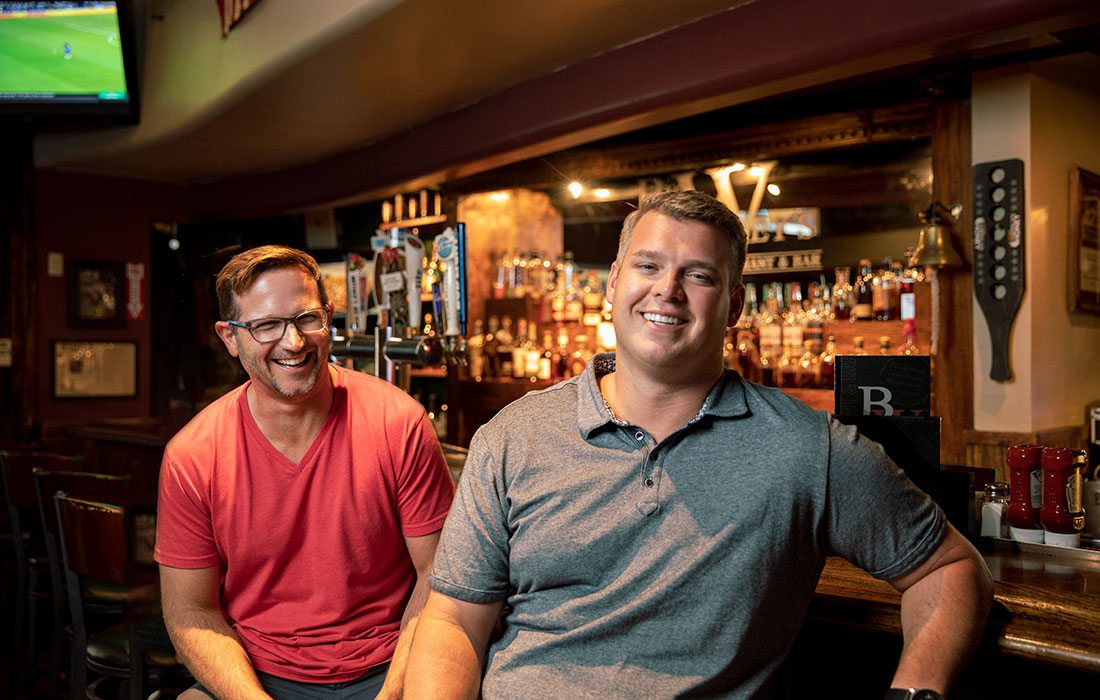
Hire Right or Head Home
Big Whiskey's American Restaurant & Bar
Founding Year: 2006
Began Franchising in: 2017
Number of Locations: 14 (8 corporate store, 6 franchises) Editor’s note: Five locations are still in progress.
The big brains at Big Whiskey’s American Restaurant & Bar say building a successful business requires first building a successful staff.
Every meal, every time. This is the driving focus that Paul Sundy and his team aim to instill in each and every one of the nearly 100 employees they train during the opening of a new Big Whiskey’s American Restaurant & Bar location. “Basically that means that the details matter,” says Sundy, who is one of five owners and operators of Big Whiskey’s and also acts as the senior vice president of operations for Big Whiskey’s Franchising. “Yes, we have to have good food and good service—that’s a given,” Sundy says. “But also, the experience matters. Our restaurants are designed based on so much more. On lights, on sound, on temperature. I’m trying to get into the psyche of your brain. ‘Every meal, every time’ is talking about the entire guest experience from the moment that guest pulls into the parking lot.”
Sundy explains that the most important aspect of creating this coveted guest experience, and ultimately the success of the restaurant as a whole, starts by making sure you get the right people on the bus. “Discovery Day is what we call it,” he says. “That’s kind of the make or break day for both sides when we’re talking to someone about franchising. We’re interviewing them as much as we hope they’re interviewing us. What we’ve found is that the best franchisees come to the table with big questions.”
“What we’ve found is that the best franchisees come to the table with big questions.”— Paul Sundy, Senior Vice President of Operations for Big Whiskey’s Franchising
Once you determine if a franchise agreement is a good fit for both sides, it’s time for the next biggest step: appropriately training all staff. This begins with each location’s owner, which is why Big Whiskey’s Franchising requires each owner to undergo personalized training at the Big Whiskey’s home office. All other major players are required to train in a Big Whiskey’s corporate location. “Corporate trainings are for general managers, assistant managers, at least one kitchen staff, at least one bar staff and another front-of-house person or server,” says Austin Herschend, president of Big Whiskey’s Franchising and a fellow owner and co-operator. This training lasts six weeks and teaches all aspects of the Big Whiskey’s brand; trainees visit multiple regional locations, shadow employees and eat their way through menus. “We know we could go and open a store anywhere, but what we’re trying to train is the culture of what we’ve created here in Springfield,” Sundy says.
While these trainings are complete in a number of weeks, the process is never really over. “We’re sending people out on a regular basis to make sure the quality is where it needs to be,” Herschend says. “You have to have infrastructure behind your brand to do that. That’s probably been the biggest investment to us—to make sure that everyone new to the restaurant space, or at least new to Big Whiskey’s, is getting what they’re paying for. It’s important to us because they’re our partner in this, and they deserve excellence.”
KEY: Red Fork & Spoon, Open Store; Blue Fork & Spoon, Coming Soon
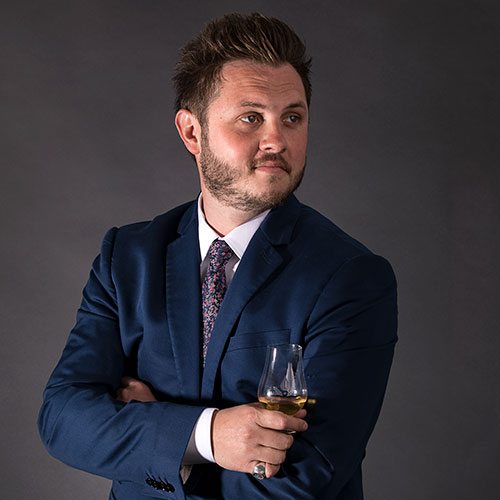
Next in Line: Josua Widner
Take a look at the most on-trend eateries and bars that have opened in Springfield in the past few years, and you’ll notice Joshua Widner had his hands in several of them. “I’m trying to create concepts Springfield has never seen,” Widner says. “The goal was never to duplicate my concepts in other markets. In my mind, these are the concepts Springfield deserves and can appreciate.”
Widner is speaking to all of the businesses he co-owns, including Scotch & Soda, The Golden Girl Rum Club and Cherry Picker Package x Fare. “Originally, Scotch & Soda wasn’t written with the intention of duplication,” Widner says. “I feel that Springfield now has multiple whiskey and cocktail programs, and I would rather seek new ventures than try to replicate my own design elsewhere. I tend to look at each market differently and fill voids where necessary.”
A second location of Scotch & Soda opened in Bentonville in 2015 but only because it was sought after by a small group of people who respected the program. “Those people were the Waltons,” Widner says.
His latest projects include opening a European-style beer hall later this year and an 11,000-square-foot food hall next spring, both in Springfield. Again, these are ideas that Widner believes in. “I think in the end, it’s very important to stay true to your vision and to stay true to your concept,” he says. “A lot of times, when you’re in the process of pitching those ideas and trying to understand your market, you get a lot of feedback. You need to carefully navigate that feedback in a way that doesn’t make you give up on your dream just to please the masses.”
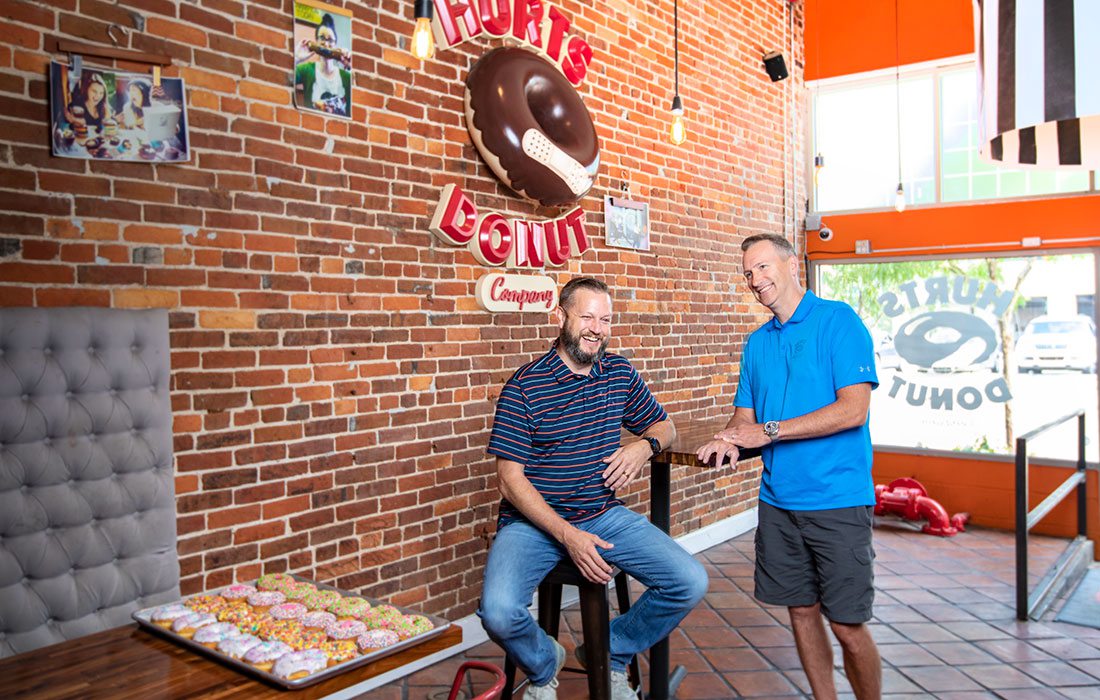
Train Hard, Work Harder
Hurts Donut Co.
Founding Year: 2013
Began Franchising in: 2015
Number of Locations: 19 (2 corporate stores, 17 franchises)
Experience makes all the difference, which is why Hurts Donut Co. requires all franchisees to undergo a rigorous training period.
What is now a line of pastry cases filled with dozens upon dozens of drool-worthy donuts all began as a few notes in a spiral bound notebook and later, an Excel spreadsheet. “I would type out each donut type, the frosting and the toppings,” says Kas Clegg, who opened Hurts Donut Co. with her husband, Tim, in 2013. “We would use that for training all of our employees,” Kas says. “Next I started taking pictures with my phone, and we’d print out the pictures with the directions.”
Today Kas and Tim own Hurts with their partner, Scott Bussard. As the store and the menu have expanded over the years, so has the training—the company now has a digital training manual that provides employees the ability to learn how to make donuts via written directions and videos on iPads. Hurts also has a 300-plus–page operations manual it shares with its franchisees, providing them with all the information needed to run the business.
“We put them through the ringer, because we're a 24-hour business.”— Tim Clegg, Co-owner of Hurts Donut Co.
Long before the Cleggs were ever positioned to franchise and train staffs of nearly 100 employees, they trained themselves on how to run a 24/7 pastry business—all in the line of fire. The couple feels this was one of the most important experiences they had in becoming owners and operators, and that’s why they require all of their franchise owners to undergo similar situations with a two-week, on-site training program in Springfield called Hurts U. “We take a lot of time in the classroom to discuss, more or less, the operations side of things,” Tim says. “But we also take them to our location downtown, where they’re able to learn the hands-on aspect of it. They spend two solid weeks there, and that’s 14 straight days with no time off and no weekends off. We put them through the ringer, because we’re a 24-hour business.”
In addition to these straight days of work, trainees are even called in for some “emergency” shifts. “After they’ve worked all day, they go home and sleep a couple of hours, then we’ll try to get ahold of them,” Tim says. “We’ll say, ‘Hey, you need to go back in and fill in.’ This is so they can experience the lack of sleep and fatigue that they will experience in actually opening our store. We try to emulate, as much as possible, what an opening is like.”
After the Springfield training, the Cleggs and a few other Hurts team members go to the franchise location to help train the staff on location. And speaking of staff, that’s an equally important thing to consider, Kas says. “I teach the franchisees to hire people as bright as our donuts,” she says. “That’s really the best way to describe it. We need people who are over the top, outgoing and overly friendly. It’s all about their personality.”
KEY: Red Donut, Open Store; Blue Donut, Coming Soon
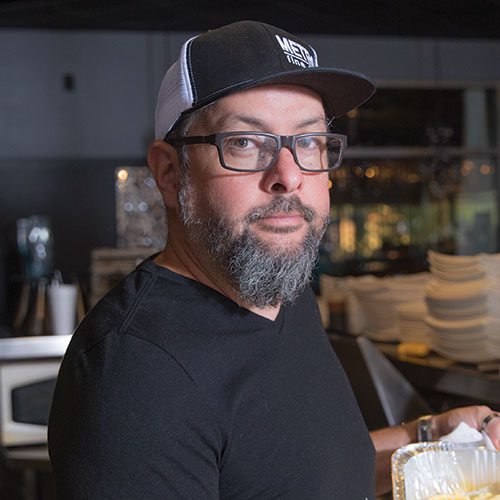
Next in Line: Pat Duran
If you love Springfield and you love food, you likely love Pat Duran. He has gifted 417-land foodies with tons of decadent menu creations over the years. But what about those who’ve never eaten at Duran’s fine dining mainstay, Metropolitan Grill? What about those who don’t live in Springfield?
Duran uses this very scenario to explain why one of his recent business ventures—opening a Great American Taco Co. location in Bentonville, Arkansas—was not a success. “I tried to go too far too fast,” Duran says. “No one in Bentonville knew who Pat Duran was.” This was a learning experience. “I learned I’d have to really define my brand first,” he says. “I couldn’t just rely on my name or my reputation there. Sometimes you have to have a failure under your belt to know what won’t work.”
Moving forward, Duran is being more strategic. He currently has two Great American Taco Co. locations in Springfield: on East Battlefield and West Republic roads, the latter of which opened this April. The restaurateur also was looking for a downtown location near press time. “I am developing protocols, procedures and training methods,” says Duran, who has goals of franchising the taco eatery outside of Springfield in the near future. “I have five years of R&D in Great American Taco Co. now. It’s been a fun ride. It’ll be a fun adventure to see what happens.”
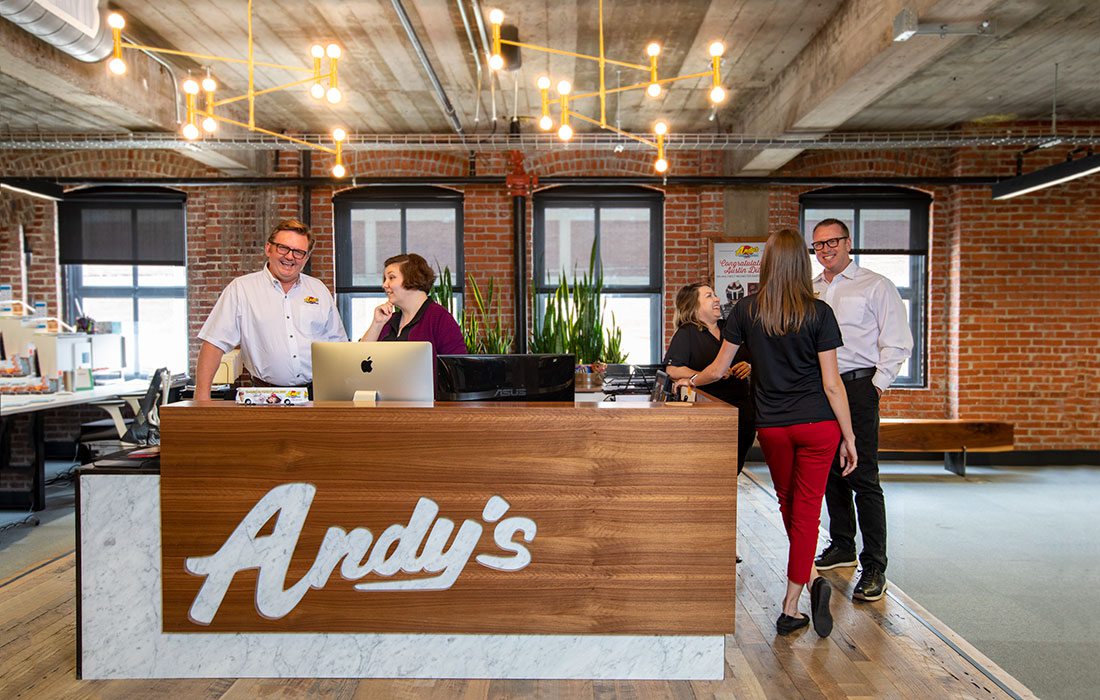
Carry on Your Culture
Andy's Frozen Custard
Founding Year: 1986
Began Franchising in: 2005
Number of Locations: 62 total (28 corporate stores, 34 franchise locations)
For Andy Kuntz and the team at Andy’s Frozen Custard, company culture revolves around community.
If you were to visit an Andy’s Frozen Custard in Frisco, Texas, you would get the exact same fast and friendly service you receive every time you visit an Andy’s in Springfield. You’ll find more of the same in Littleton, Colorado, and again in Mesa, Arizona. “Andy’s is a place that’s family-oriented,” says Andy Kuntz, the company’s president and CEO. “We strive to make the experience at Andy’s in other locations very similar to what it is in Springfield.”
Successfully creating this customer experience at an Andy’s locations in 11 states involves a lot more than signing paperwork. As Kuntz discusses this approachable, friendly company culture—a culture that has been growing ever since Andy, his parents, and his wife, Dana, started serving frozen custard at the first location in 1986—he repeatedly goes back to one thing: community. “When we get into marketing, there’s a major grassroots aspect,” Kuntz says. “Here in Springfield, we go to charity events. We donate to schools. That’s part of our DNA—we want to be involved in the community, and we have all of those things here because we live here. But when you go into a new market, you don’t have those things. You have to help build that brand. You have to get ingrained.”
“You have to find people that truly want to buy into your culture.”— Andy Kuntz, President and CEO of Andy’s Frozen Custard
This grassroots marketing holds major importance at all Andy’s corporate stores, and it’s also shared with all franchise stores. But long before these grassroots efforts can be put into action, you must make sure you have the correct leaders in place. “You have to find people that truly want to buy into your culture,” Kuntz says. “You have to figure out their ideal culture, their way of thinking and the kind of people they want to hire.” Finding individuals who can truly lead is the other half of the battle. “These individuals have to be willing to have tough conversations if needed,” Kuntz says. “They have to make sure that the business is running like a business, because there’s a lot more to it than just scooping custard.”
This was one of many lessons Andy’s learned when it began franchising 19 years after first opening its doors. “It would have been very helpful for us to have gone and opened a corporate store outside of Springfield before we started franchising,” Kuntz says. “Franchising, in my opinion, is harder than running your own stores. You’re going from being a player to a coach. To open up a few stores in the market you live in is one thing, but to expand in different markets is an entirely different game. You have to really dig deep and think of all the things you do to make your company successful, and then you have to communicate it to your franchisees. The more you can expand your business on your own dollars before you franchise, the better.”
KEY: Red Cone, Open Store; Blue Cone, Coming Soon; Map courtesy Andy's Frozen Custard
Been There, Done That
James Tillman and Joseph Hulston, as well as Richard and Katie Vance, have all brought big-name businesses to southwest Missouri. Read on for their tips on investing in your own franchise.Look to Trends. James Tillman, who owns and invests in multiple 417-land businesses and brought First Watch to Springfield along with his partner, Joseph Hulston, says to think about trends when you’re thinking about investments. “First Watch offers items that are fresh and healthy,” Tillman says. “It’s liked by everyone from senior citizens to millennials.”
Locate with Purpose. When you’re looking to locate, be selective. “Do not pick a bargain back-row beauty,” Tillman says. “It’s all about location. Signalized intersections with a strong traffic count is what you’re looking for.” Richard and Katie Vance, who offer consulting services with their company, Southern Solutions Consulting, agree. “What we boil it down to is location with gut,” Richard says.
Know Your Market. Will people in your city be interested in purchasing your product? If you’re serving food, will they drive where you are to eat what you offer? “You have to know what the town wants, and where it needs to go,” Katie says. “A lot of times, places that fail in Springfield are opened by people coming in from out of town.”
Do Your Research. If you’re going to buy a franchise, make sure it’s a viable one that is going to support you. You’re buying a system. “If you follow this system, you don’t have to recreate the wheel,” Richard says. “You just have to enhance the wheel and make sure it’s turning in that particular town.”
Prepare to work. Hard. No business will be successful without a lot of hard work. “As an owner, you will do what no one else wants to do,” Tillman says. “It’s a big commitment to open a franchise, and success doesn’t happen overnight.”
Pros to Know
These experts can help you increase your company's growth game.When you’re ready to expand your business, Wendy Swope is ready to help you. With her company, Lakeland Marketing, Swope helps clients price merchandise and products, develop menu items, create custom products and more. Swope’s experience includes work with Bass Pro Shops, Big Cedar Lodge, Big Whiskey’s American Restaurant & Bar and Bair’s Sports Grill.
Contact: Wendy Swope, 417-425-7294, wswope@lakelandspg.com
David Foster and his associates—two trusty part-time staffers and multiple on-demand sources—work together to help make big things happen for businesses that want to make it big. Foster & Associates helps clients with a variety of needs, including sales and profitability improvement, menu overhauls, process development, staff training and more. There are many local companies in Foster’s portfolio, including Andy’s Frozen Custard, Neighbor’s Mill Bakery & Café and Hilton Garden Inn.
Contact: David Foster, 417-849-1903, dfoster@fosterandassociates.net
Newk’s Eatery. TCBY. Quiznos. Mrs. Fields. Old Chicago. These big-name companies all have one thing in common: They’ve worked with Franchise Dynamics to help their strategic franchise development. The company is headquartered in the Chicago suburbs, but Franchise Dynamics has an operations center in Springfield. Company President and Chief Development Officer Charles Dobyns says it helps brands that specialize in 25 or more franchise locations.
Contact: Charles Dobyns, 417-425-7350, cdobyns@franchisedynamics.net
